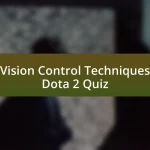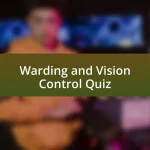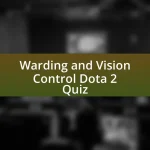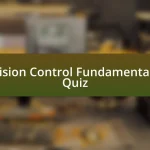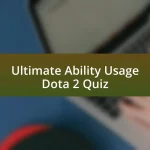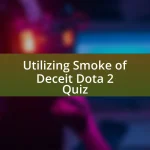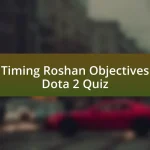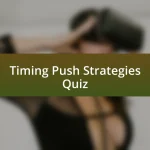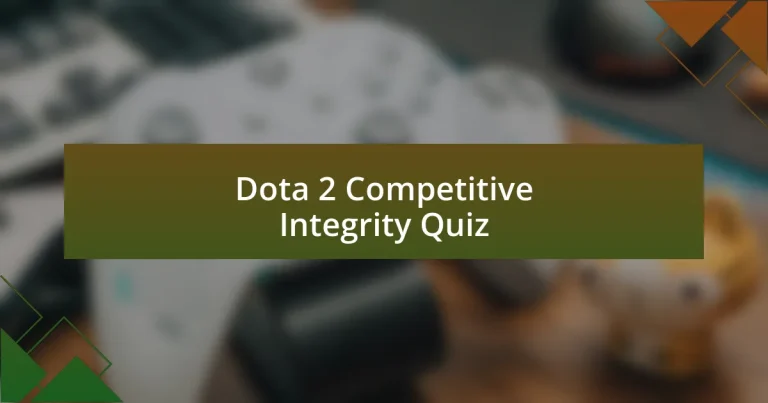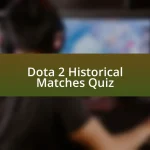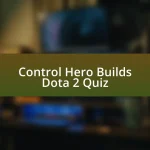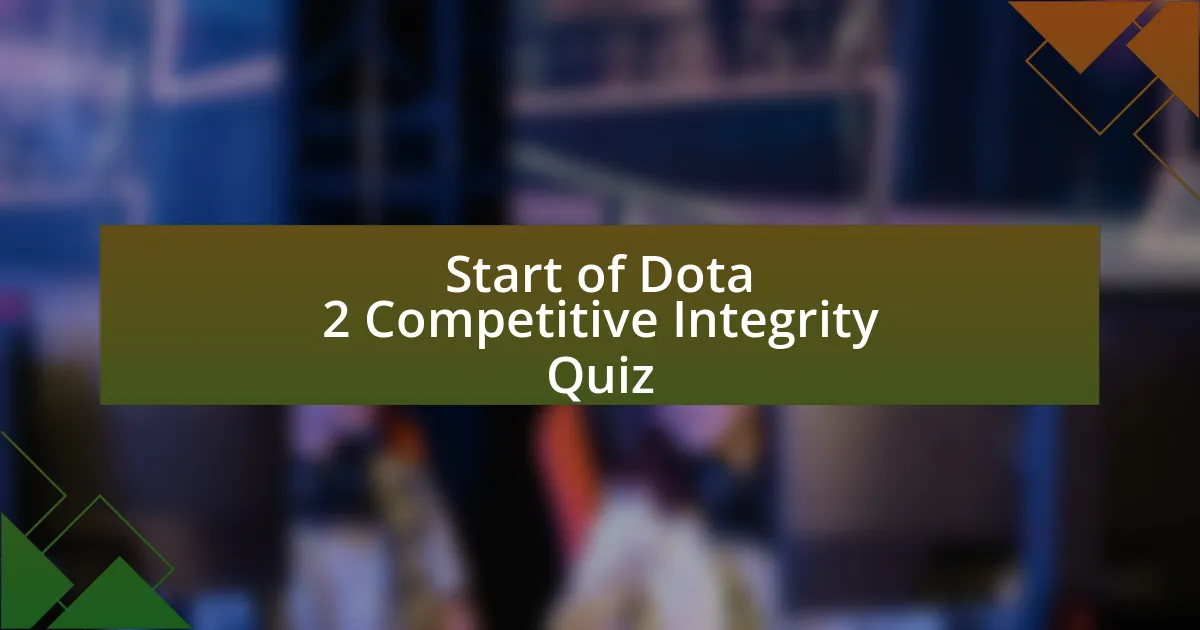
Start of Dota 2 Competitive Integrity Quiz
1. What is the minimum number of players required for a Dota 2 team?
- Six players.
- Three players.
- Four players.
- Five players.
2. Can a player be registered for more than one team during a tournament?
- No, each player can be registered and play for only one team during a tournament.
- Yes, players can join multiple teams freely during the tournament.
- Only one player is allowed per team, but teams can share players.
- Players can switch teams at any time within the tournament.
3. What is the maximum number of substitute players allowed per team?
- One substitute player.
- Four substitute players.
- Two substitute players.
- Three substitute players.
4. What happens if a team or player uses profanities, obscene language, or racist content in their name or icon?
- The team or player will be given a penalty fee.
- The team or player will be required to change their name or icon.
- The team or player will be disqualified and banned.
- The team or player will receive a warning only.
5. What is the consequence for using alternative spellings to avoid prohibited content in team or player names?
- Players will be suspended for one match.
- Teams will receive a warning.
- Teams must change their name immediately.
- Players or teams will not be allowed to participate.
6. What is the requirement for account sharing in competitive Dota 2?
- Players must share accounts during tournaments.
- Any player can share their account.
- Competitors must not share accounts.
- Teams are allowed to share accounts.
7. What is the penalty for refusing to participate in media obligations and publicity as requested by the tournament organizers?
- Disqualification or penalty on prizes.
- Warning or fine.
- Match replay.
- Suspended from future tournaments.
8. What behavior is strictly prohibited in-game and on Discord?
- Game exploitation, solo queuing, friend messaging.
- Team teaming, trading accounts, account sharing.
- Swearing, hostility, racist or abusive behavior.
- Game boosting, sharing strategies, trading items.
9. What happens if severe abuse cases with radical statements or threats of physical violence are reported?
- No action taken and continued participation.
- Minor warnings or temporary suspensions.
- Significant penalties including disqualification or future tournament bans.
- Public apologies without further consequences.
10. What is expected of participants in terms of fair play and sportsmanship?
- Use of aggressive tactics and underhanded strategies.
- The highest standards of fair play and sportsmanship.
- Encouraging players to cheat or deceive opponents.
- Complete disregard for rules and teamwork.
11. What is considered a violation of player conduct?
- Throwing a match, halting play without cause, or showing a flagrant lack of effort.
- Using emojis in chat during matches.
- Complaining about lag during the game.
- Selecting a hero outside the meta.
12. What is the penalty for betting or gambling during a tournament?
- A fine of $1000 and warning.
- A verbal warning from the referee.
- Severe penalties including lifetime bans from all tournaments.
- Temporary suspension for one match.
13. What happens if a player impersonates another player, staff member, referee, sponsor, or partner?
- The player receives a minor penalty.
- A warning is issued.
- Severe penalties including bans.
- The player is suspended for one match.
14. How many Heroes can participate in a Dota 2 game match?
- Up to 12 Heroes per team.
- Up to 8 Heroes per team.
- Up to 10 Heroes per team.
- Up to 5 Heroes per team.
15. How many characters does the game have as of 2023?
- 150 characters
- 130 characters
- 124 characters
- 115 characters
16. What role requires the player to farm a lot of gold items and experience?
- Carry
- Support
- Mid
- Jungle
17. What is the consequence for not complying with the rules regarding team size and substitutions?
- Penalties including match loss or draft penalties.
- Disqualification and lifetime ban from tournaments.
- Automatic win for the opposing team.
- Reprimand from tournament officials.
18. What is the purpose of recording and uploading POV demos?
- To promote player popularity online.
- To share strategies with fans.
- To ensure competitive integrity.
- To record gameplay for streaming.
19. Who monitors each team’s voice communication and individual player and coach cameras?
- Referees
- Coaches
- Players
- Spectators
20. What is the purpose of monitoring the matches directly on the game server?
- To ensure competitive integrity.
- To improve server performance during games.
- To track player statistics for marketing.
- To allow players to change teams mid-match.
21. What is the purpose of extended delay in broadcast streams?
- To increase broadcast quality and resolution.
- To enhance player performance and skills.
- To prevent cheating and ensure competitive integrity.
- To limit audience engagement and interaction.
22. How many referees work on each individual match for Masters Level tournaments?
- Four referees.
- One referee.
- Three referees.
- Two referees.
23. What is the rule regarding coaches during Regional Major Ranking (RMR) tournaments?
- Coaches must remain silent during the entire tournament.
- Coaches are allowed in bootcamp rooms and voice communication.
- Coaches are banned from entering any tournament space.
- Coaches can only communicate with players through a third party.
24. What happens if a team is found to be engaging in cheating or unethical behavior?
- Players will be replaced with substitutes immediately.
- A fine will be imposed on the team.
- The team will receive a warning and continue playing.
- Match loss to all concerned matches, and in extreme cases, disqualification.
25. What is forbidden in terms of scripts and programs?
- Game mods that enhance graphics.
- Macro scripts and unauthorized programs.
- Debugging tools for strategizing.
- Custom game modes for practice.
26. What is prohibited for athletes during an ongoing match?
- Taking unauthorized breaks.
- Viewing broadcasts of their games.
- Using performance-enhancing drugs.
- Eating during the match.
27. What is the rule regarding team communications during the draft phase?
- Teams are not allowed to communicate at all during the draft.
- Coaches must remain silent throughout the draft phase.
- Coaches can stay in the voice channel, but must leave after the draft phase.
- Coaches must leave the voice channel before the draft starts.
28. How many athletes are allowed in the voice chat during the match?
- Six athletes.
- Three athletes.
- Five athletes.
- Four athletes.
29. What is the rule regarding coaches in the game lobby?
- Coaches can enter the game lobby only if requested by players.
- Coaches are not allowed in the game lobby.
- Coaches are allowed in the game lobby only during breaks.
- Coaches must always be present in the game lobby.
30. What is the rule regarding communication between athletes and coaches during the game?
- Coaches are not allowed to communicate with the team during the game.
- Coaches may communicate via text chat throughout the game.
- Coaches can only communicate during timeouts.
- Coaches can freely communicate at any time during the game.
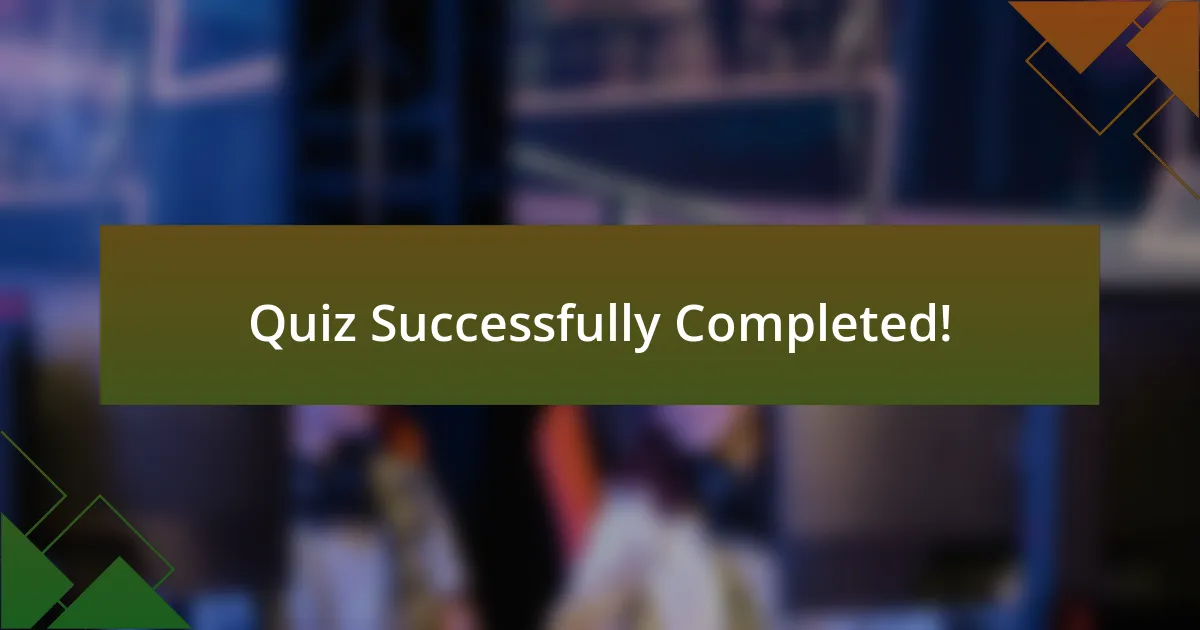
Quiz Successfully Completed!
Congratulations on finishing the quiz on Dota 2 Competitive Integrity! We hope you enjoyed the process and found it both entertaining and informative. This quiz has likely revealed some new insights about the structure and principles that uphold fairness in competitive gaming. Understanding these concepts is crucial for anyone who is passionate about Dota 2 and esports in general.
Throughout the quiz, you may have learned about the importance of fair play, the role of regulations, and how competitive integrity shapes the gaming environment. These principles not only enhance the player experience but also ensure that all competitors have a level playing field. As you continue to explore this subject, you’ll notice how critical these elements are in maintaining trust and credibility in esports.
To further your understanding, we invite you to check out the next section on this page dedicated to Dota 2 Competitive Integrity. There, you will find a wealth of information that dives deeper into this essential topic. Whether you are a player, a fan, or someone interested in the industry, expanding your knowledge is always beneficial!
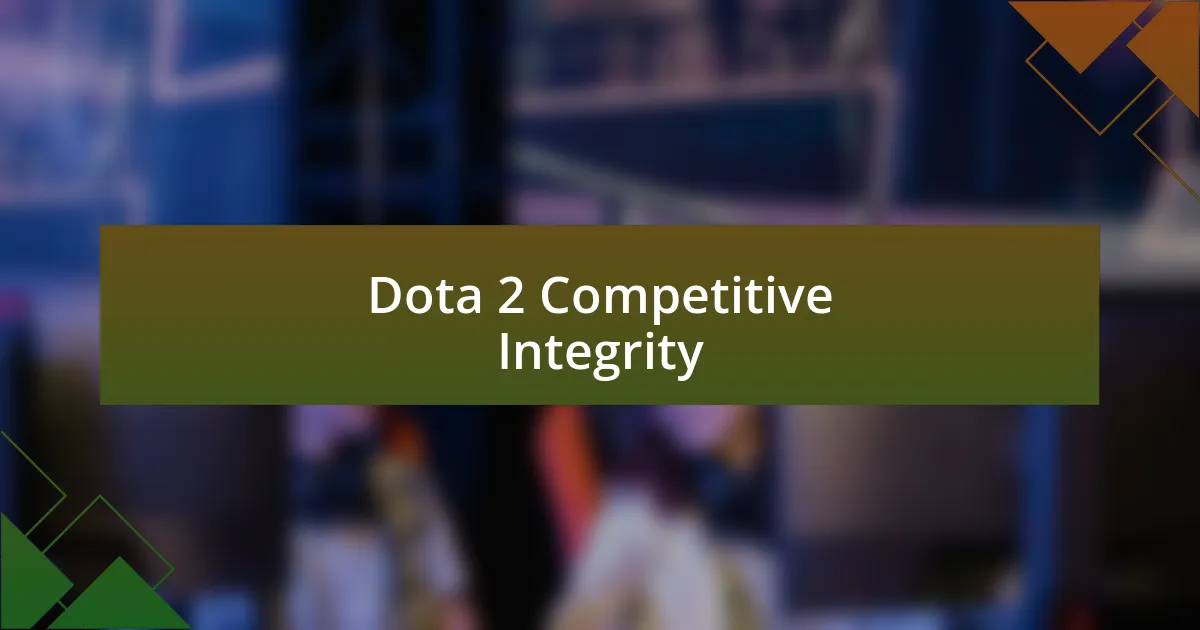
Dota 2 Competitive Integrity
Dota 2 Competitive Integrity Overview
Competitive integrity in Dota 2 refers to the principles and standards that govern fair play, ensuring that all players and teams have an equal opportunity to succeed. This involves rules against cheating, doping, and match-fixing. The integrity measures are vital to maintaining trust among players, teams, and fans. They help to uphold the competitive environment and promote a level playing field.
Role of Anti-Cheat Systems
Anti-cheat systems play a crucial role in Dota 2’s competitive integrity by detecting and preventing cheating. These systems monitor player behavior and in-game actions. They aim to identify unauthorized software that provides unfair advantages. Regular updates and improvements enhance their effectiveness, ensuring a more reliable competitive experience.
Impact of Match-Fixing Scandals
Match-fixing scandals can severely damage the competitive integrity of Dota 2. These incidents undermine the trust of fans and stakeholders. They can lead to severe punishment for involved players and teams, including bans and disqualifications. Such scandals highlight the importance of continuous monitoring and strict enforcement of integrity policies within the esports environment.
Player Conduct and Regulations
Player conduct regulations are essential for maintaining competitive integrity in Dota 2. Players must adhere to a code of conduct that promotes sportsmanship and respect. Violations, such as harassment or unsportsmanlike behavior, can result in penalties. Stricter regulations encourage a healthier competitive atmosphere and reinforce community standards.
Tournament Organizers and Their Responsibilities
Tournament organizers play a vital role in ensuring competitive integrity in Dota 2 events. They establish rules, oversee match operations, and enforce penalties for violations. Organizers must remain impartial and transparent to maintain credibility. Their effective management is crucial for upholding fairness, which is fundamental to the esports ecosystem.
What is Dota 2 Competitive Integrity?
Dota 2 Competitive Integrity refers to the ethical guidelines and standards that govern the fair conduct of players, teams, and organizations in the Dota 2 esports scene. It ensures that competitions are free from cheating, match-fixing, and unethical behavior. The International Esports Federation (IESF) and Valve Corporation, the game’s developer, enforce these standards through rules and regulations that promote fair play, transparency, and accountability.
How is Dota 2 Competitive Integrity maintained?
Dota 2 Competitive Integrity is maintained through a combination of stringent rules, monitoring systems, and reporting mechanisms. Tournament organizers implement strict anti-cheat measures and use software to detect tampering. Players are often required to sign contracts that outline consequences for violating competitive integrity. Valve conducts investigations on reported incidents to uphold fairness and penalize misconduct.
Where can players report violations of Competitive Integrity in Dota 2?
Players can report violations of Competitive Integrity in Dota 2 through the official Valve website and various tournament organizers’ platforms. Most esports events have dedicated support channels for reporting cheating or match-fixing. Additionally, the Dota 2 in-game reporting system allows players to flag suspicious behavior during matches, ensuring that serious concerns are addressed efficiently.
When are violations of Competitive Integrity most likely to occur in Dota 2?
Violations of Competitive Integrity are most likely to occur during high-stakes matches, such as major tournaments or qualifiers. The pressure to win can lead to unethical behavior. Historical incidents, such as the match-fixing scandals in 2015 involving various teams, illustrate that the potential for corruption increases in competitive environments where significant monetary rewards and prestige are at stake.
Who is responsible for enforcing Competitive Integrity in Dota 2?
Valve Corporation and tournament organizers are primarily responsible for enforcing Competitive Integrity in Dota 2. Valve sets the overarching rules and guidelines for the game and its competitive scene. Each tournament organizer, such as ESL or DreamHack, implements these standards at their events, ensuring compliance with the established rules and investigating any breaches.



